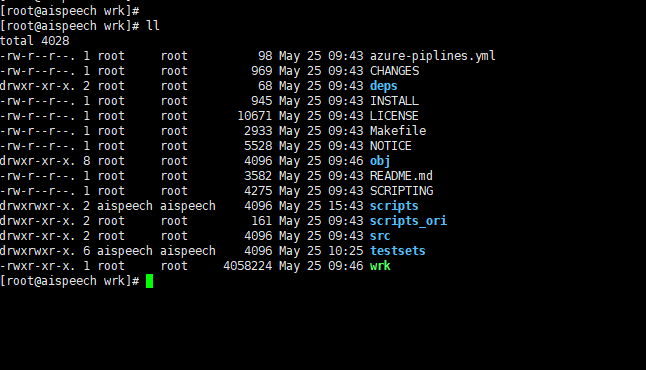1.介绍
wrk是一种现代HTTP基准测试工具,当在单个多核CPU上运行时,能够产生大量负载。它结合了多线程设计和可伸缩事件通知系统,例如epoll和kqueue。
2.安装
# 下载源码
git clone https://github.com/wg/wrk
#编译(可执行文件wrk在当前目录下)
make -j4
#建立软连接
ln -s 编译目录/wrk /usr/local/bin/wrk
3.示例demo
Usage: wrk <options> <url> Options: # 脚本开启的HTTP连接数 -c, --connections <N> Connections to keep open # 测试脚本执行的时长 -d, --duration <T> Duration of test # 测试脚本使用的线程数 -t, --threads <N> Number of threads to use # 加载Lua脚本文件 -s, --script <S> Load Lua script file # 添加请求的信息头 -H, --header <H> Add header to request # 打印响应的详细信息 --latency Print latency statistics # 请求超时时间 --timeout <T> Socket/request timeout # 版本详细信息 -v, --version Print version details
[root@localhost wrk]# ./wrk -t4 -c100 -d60s --latency http://www.cnblogs.com/imyalost Running 1m test @ http://www.cnblogs.com/imyalost 4 threads and 100 connections Thread Stats Avg Stdev Max +/- Stdev Latency 196.87ms 318.88ms 1.90s 86.33% Req/Sec 316.86 220.75 3.19k 75.19% Latency Distribution 50% 5.73ms 75% 259.62ms 90% 615.77ms 99% 1.47s 73434 requests in 1.00m, 11.06MB read Socket errors: connect 0, read 2, write 0, timeout 267 Requests/sec: 1222.07 Transfer/sec: 188.51KB
结果解析: 4 threads and 100 connections :4个线程,发起100个http连接请求; Thread Stats Avg Stdev Max +/- Stdev :测试结果统计(精简版jmeter的聚合报告),分别是:平均值、标准偏差、
最大值、偏差比(值越高表示测试结果离散程度越高,性能波动较大); Latency :响应时间分布(即百分比响应时间范围); Req/Sec :每秒完成的请求数; Latency Distribution :如上面的示例结果,分别代表50/75/90/99%的响应时间在多少ms以内; 73434 requests in 1.00m, 11.06MB read :本次测试共计在1min内发起73434个请求,总计读取11.06MB的数据; Socket errors: connect 0, read 2, write 0, timeout 267 :本次测试中,连接失败0个,读取错误2个,超时267个; Requests/sec :所有线程平均每秒钟完成1222.07个请求; Transfer/sec :平均每秒读取188.51KB数据(吞吐量);
4.Lua脚本示例

package.cpath = '/usr/local/lualib/?.so' local cjson = require("cjson.safe") function init() end function request() -- http报文头设置 --wrk.headers["content-type"]= "application/json" --wrk.headers["Connection"] = "Keep-Alive" -- http报文路由设置 local path = "/nlu/v2/dispatch?productId=tryProductId&recordId=UNITTEST_RECORDID_11&requestId=UNITTEST_REQUESTID_11" -- 报文头设置 local headers = {} headers["content-type"]= "application/json" headers["Connection"] = "Keep-Alive" -- http报文体设置 local body = { request = { input = "天气怎么样", }, context = { skills = {} }, version="1.0" } table.insert(body.context.skills, {id = "2019122100000021", version = "1"}) local tmp = cjson.encode(body) local msg = wrk.format("POST", path, headers, tmp) -- 返回请求报文(不可以是nil) return msg end function response(status, headers, body) print("status:",status) print("headers:",headers) print("body:",body) end